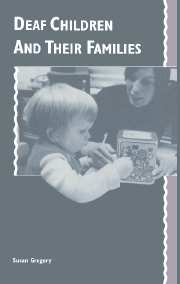Book contents
- Frontmatter
- Contents
- Foreword
- Preface to the 1995 edition
- Acknowledgements
- 1 The Handicap of Deafness
- 2 The Deaf Child at Play
- 3 Day-to-Day Living
- 4 Discipline and Punishment
- 5 Learning to Communicate: Equipment
- 6 Learning to Communicate: Education
- 7 Coming to Terms with Deafness
- 8 Family Life with a Deaf Child
- 9 The Family and the Community
- 10 Overview
- Appendix I The Interview Schedule
- Appendix II The Interview Situation: Advantages and Disadvantages
- Appendix III The Sample
- Bibliography
- Index
Foreword
Published online by Cambridge University Press: 24 November 2009
- Frontmatter
- Contents
- Foreword
- Preface to the 1995 edition
- Acknowledgements
- 1 The Handicap of Deafness
- 2 The Deaf Child at Play
- 3 Day-to-Day Living
- 4 Discipline and Punishment
- 5 Learning to Communicate: Equipment
- 6 Learning to Communicate: Education
- 7 Coming to Terms with Deafness
- 8 Family Life with a Deaf Child
- 9 The Family and the Community
- 10 Overview
- Appendix I The Interview Schedule
- Appendix II The Interview Situation: Advantages and Disadvantages
- Appendix III The Sample
- Bibliography
- Index
Summary
This study of the difficulties and dilemmas encountered by a representative sample of the parents of young deaf children falls clearly within the tradition of work originating from the Child Development Research Unit at Nottingham University. It places strong emphasis on the parents' own appraisal of the task which confronts them in dealing with their own ‘special’ children. An insistence upon the parental perspective gives us the opportunity of understanding the development of the young deaf child in his natural setting of ordinary everyday family life, and, moreover, makes the insights of these particular parents available to others who may find themselves in a similar predicament. But these are not the only justifications for taking such a methodological approach. By using the parents of deaf children as a major resource for her investigation, Dr Gregory has drawn upon the intensive, long term, intimate experience of 122 mothers with 122 individual children; and this pooled experience she offers to the professional worker, whose own experience covers a variety of children but to a lesser degree of intimacy or involvement. The consequence could be a meeting-point of perspectives, so that professionals are enabled to take a new look at how they present their expertise to families, and are helped to make that expertise more relevant to their needs and hence more effective at every level. Never has this been more important that now, when there has been a deliberate shift in policy towards the progressive integration of handicapped children generally within the ordinary community.
- Type
- Chapter
- Information
- Deaf Children and their Families , pp. ix - xiiPublisher: Cambridge University PressPrint publication year: 1995



